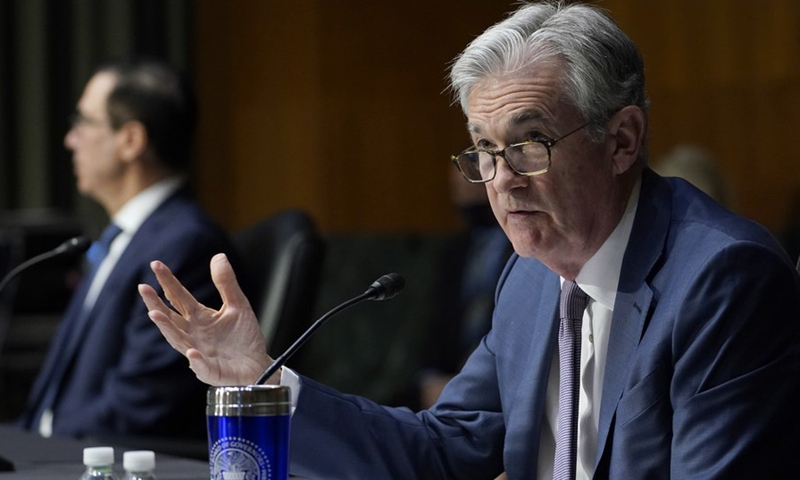U.S. Federal Reserve Chairman Jerome Powell testifies at a hearing on Capitol Hill in Washington, D.C., the United States, Dec. 1, 2020.(Photo: Xinhua)
The US Federal Reserve Chairman Jerome Powell on December 15 set out plans to accelerate the withdrawal of multi-trillion-dollar stimulus and signaled an intention to raise interest rates three times next year after its bond taper ends.
One day after the Fed’s announcement, the European Central Bank took a diverging policy path in the sense that it would ramp up new emergency bond-buying programs to keep the Euro-zone’s recovery on track and wouldn’t increase its key interest rate, currently set at minus 0.5 percent, until it ends its net bond purchases. It is “very unlikely” that we will raise interest rates in the year 2022, noted by the European Central Bank (ECB) President Christine Lagarde.
After Britain’s two main markets revealing monetary policies in opposite directions, on 16 December the Bank of England (BOE) decided to lift the policy rate to 0.25 percent from a record low of 0.1 percent, becoming the first of the world’s major central banks to raise its benchmark interest rate since the pandemic began.
As the BOE has tightened the monetary screws faster than America’s Federal Reserve, the pound strengthened against the dollar rapidly. Amid growing concerns over the world economy, investors are expected to see Britain as an island of stability or a safe haven and queue up for British assets.
Although differing approaches underscore the challenges for policy makers when they balance surging inflation and renewed risks to growth from the pandemic, the BOE’s action came when surging cases of the fast-spreading Omicron variant of the coronavirus has triggered new restrictions in the run-up to Christmas to stem a wave of spread in the UK.
A natural question to ask: is Britain making a comeback to usurp America’s financial hegemony?
“What role should Britain play in the world” is a question Britain has grappled with off and on for decades, which has become a refreshing one after Brexit. On March 16, Britain’s Conservative government published an Integrated Review called “Global Britain in a Competitive Age” into the country’s foreign, security, defense and aid policy, billed as the most radical rethink of Britain’s international stance since the end of the cold war. The Integrated Review lays out the vision of “Global Britain,” suggesting ambitions far beyond Europe.
With sheer economic clout and nearly a quarter of the world’s population and territory at its zenith, British Empire had been the world’s pre-eminent power until the World War II.
Since the 1820s, free convertibility with gold enabled the sterling pound to hold a central place in the global financial world, acting as the measure of value, means of circulation, storage, and payment, and world reserve currency. The pound offered access to London, the then-world’s biggest and most stable financial center. It also played an active role in promoting international co-operation and helping stabilize current-account surpluses and deficits. As a result, the sterling pound dominated the financial world in the late 19th century, facilitating transactions for more than 60 percent of trade and 90 percent of public-debt issuance around the world.
In the wake of America’s economy overtaking Britain’s in size in around 1880 and the Federal Reserve being established in 1913, the dollar began to gain ground in the aftermath of the World War I. The sterling regained some ground when America was hit by a series of banking crises in the early 1930s. During the Suez crisis in 1956,Britain was humiliated, the sterling’s status of world’s main reserve currency was finally superseded by the dollar and America’s financial hegemony took hold.
In recent decades, a lonesome Britain has often been clouded by nostalgia for lost empire and great-power status. The post-Brexit era set Britain off on a journey in pursuit of “Global Britain,” including rolling over trade deals with countries from Japan to Turkey, a bumptious “tilt to the Indo-Paci?c,” a region with growing importance for everything from trade to security.
How great is the likelihood for the sterling to take back its lost status of world’s main reserve currency from the dollar?
Professor Barry Eichengreen of the University of California at Berkeley argues that the “size, stability, and liquidity” matter most for the reserve status, in his article included in the Handbook of the History of Money and Currency. He also points out that the dollar’s status of a reserve currency is owing to the fact that the dollar was stable and the US had the largest and most liquid financial markets in the world and the capacity to project military and diplomatic power.
However, misguided policies taken in Washington in recent years that affect the “size, stability, liquidity,” have been hastening the decline of dollar as a reserve currency.
Due to geopolitics calculations, the US governments have engaged in degrading international financial co-operation, such as introducing trade protectionist measures by populist politicians from both the left and right, refusing to co-operate with the world’s other big economies, churlishly tanging with developing countries like China over reform of the IMF and the World Bank, boycotting Chinese initiatives such as the Asian Infrastructure Investment Bank. In the long-run, such policies proved counterproductive and have undermined America’s growth, and the dollar’s standing, and terminally damaging its reputation for reliability and stability.
Against this backdrop, the sterling has a reasonable chance to regain lost ground, but Britain has made similar mistakes.
Britain is still a manifestly significant power in terms of “size, stability, liquidity” of financial markets, though it was no longer the leading one as in the first half of the 20th century. Among others, it is now the fifth-largest economy in the world and one of the five nuclear-armed states with a permanent seat on the UN Security Council.
Squarely misled by the China sceptics, beneficial China-UK investment and technological partnerships have been damaged in recent years and hostile actions have been taken against Chinese tech firms, for example, Huawei, a Chinese telecoms giant, has been banned from Britain’s 5G networks.
Suffice it to say that, to stake a claim to financial hegemony, the front-and-center task for Britain is to learn the historical lesson from America’s policy mistakes, correct its own policy mistakes and follow a rule of thumb that Britain must strengthen rather than breakdown international financial co-operation down the road, especially with world’s other big economies such as China.
The main task instead for America is to maintain its financial hegemony is simply to correct its policy mistakes, especially when it comes to China.




